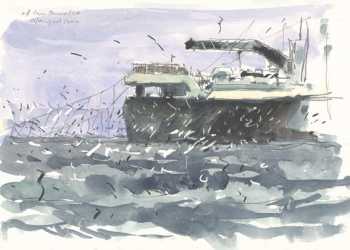The 31st Meeting of the Commission for the Conservation of Antarctic Marine Living Resources (CCAMLR XXXI) concluded in Hobart, Tasmania, Australia on 1 November, with no decision reached on proposals to create large Marine Protected Areas (MPAs) in the Southern Ocean. News of "where to now" on Southern Ocean MPAs has been given in the previous posting to ACAP Latest News (click here).
ACAP's Executive Secretary, Warren Papworth, represented the Agreement at the meeting. In his submission to CCAMLR XXXI he noted that information presented to the meeting suggested as a result of inspections in the ports of several CCAMLR members that a number of CCAMLR Members' vessels had not fully complied with relevant CCAMLR seabird conservation measures.

A trawler trails bird-scaring lines behind it as albatrosses gather
Artwork courtesy of Bruce Pearson
However, CCAMLR's Standing Committee on Implementation and Compliance (SCIC) noted that all of the incidents of non-compliance related to fishing activities outside (i.e. north of) the CCAMLR Convention Area. The information presented highlights that CCAMLR Members do have the capacity to address the bycatch of seabirds in adjacent longline and trawl fisheries to the north of the CCAMLR Convention Area, which are known to impact many ACAP-listed species of albatrosses and petrels. If CCAMLR Members who fish in these areas voluntarily adopt mitigation measures that have been shown to be effective in eliminating seabird bycatch, they will address a key threat to the survival of many populations of seabirds that occur within the CCAMLR Convention area and in regions to the north.
ACAP encourages relevant CCAMLR Members to take such action now, and not wait for the adoption and implementation of conservation measures in adjacent fisheries, which could take many years to become effective.
Warren Papworth, ACAP Executive Secretary, 7 November 2012

 English
English  Français
Français  Español
Español